In fairness he did later appologize and specificaly stated his behavior was wrong. But still,I watched that “David Atkin” or whatever his name was continuously interrupt Pierre Poilievre in the middle of each sentence as he was at the podium, with that reporter shouting over top of the PA system.
Here I thought that a reporter was supposed to report the news and not become the news in a situation like that?? He is no better than that other clown with Rebel News (I can’t remember his name offhand).
Bill’s C-10 & C-11. If we aren’t talking about it already, shouldn’t we be?
- Thread starter Ron in Regina
- Start date
You are using an out of date browser. It may not display this or other websites correctly.
You should upgrade or use an alternative browser.
You should upgrade or use an alternative browser.
But still….damn. That was hugely unprofessional and the rest of the entire room of reporters wasn’t doing that. David Atkin isn’t Justin Trudeau giving us “a lesson we can all learn from” but was just being a Dick!In fairness he did later appologize and specificaly stated his behavior was wrong. But still,
That was a disruptive Shill KNOWING he was going to make the news being at the centre of a story instead of reporting on it.
In fairness, after watching that behaviour from a grown ass man in a professional capacity, hearing that he’s apologized, rings hollow at best. Disingenuous is the term that comes to mind.
Yeah - i suspect there was probably talk that if he was going to do that maybe he wouldn't be allowed into future press briefings so he apologizedBut still….damn. That was hugely unprofessional and the rest of the entire room of reporters wasn’t doing that. David Atkin isn’t Justin Trudeau giving us “a lesson we can all learn from” but was just being a Dick!
That was a disruptive Shill KNOWING he was going to make the news being at the centre of a story instead of reporting on it.
In fairness, after watching that behaviour from a grown ass man in a professional capacity, hearing that he’s apologized, rings hollow at best. Disingenuous is the term that comes to mind.
There was probably a consensus after seeing how other reporters recorded HIS story that he wasn’t the hero he thought he was going to be….so maybe a little from column A & a little from column B?Yeah - i suspect there was probably talk that if he was going to do that maybe he wouldn't be allowed into future press briefings so he apologized
With his outburst on Tuesday though, Akin was over the top. He wouldn’t even let Poilievre deliver his statement before he started yelling at him. Outside of partisans, who already don’t like Poilievre, most people watching the exchange would think Akin didn’t look good.
And that includes Akin himself, who apologized later that day saying many viewers and readers said he was rude.
“I agree. I’m sorry for that. We all want politicians to answer questions — but there are better ways of making that point,” Akin posted to Twitter.
Battles between the Parliamentary Press Gallery over access to politicians and the ability to ask questions have been going on for years. I was there for the boycott and walkout on one of Stephen Harper’s news conference way back in 2006 or so.
The problem is that as a group, the issue of access really only becomes an issue when it is Conservatives in power. I can’t tell you how many useless process stories I’ve seen about how Harper would only take five questions or would limit the amount of time he would spend.
You know who else does that without all the stories painting him out to be a bad man afraid of the media and democracy?
Justin Trudeau.
Yet it is only an issue, only becomes a major story, if the Conservatives have limits.

LILLEY: There is a Liberal media bias on the Hill but David Akin isn't the problem
The dust up on Parliament Hill between Pierre Poilievre and a member of the press gallery sure doesn’t look good.
There are many good reporters in every newsroom in Ottawa, yes, even CBC. People also need to know that any bias, real or perceived, isn’t due to the media bailout fund (?), which newspapers get but TV networks don’t, it’s simply because most journalists – consciously or unconsciously – agree with Liberal policies and are skeptical of Conservatives.
Really? Seriously? So the CBC print gets a bailout & that doesn’t affect the CBC Television Network? Same with Global News (Print & TV) or Sun (Print & TV)? Glad that’s cleared up.
Canada's TV networks look to Bill C-11 as a lifeline, it's the wrong solution
Author of the article:Brian Lilley
Publishing date:Sep 16, 2022 • 1 day ago • 3 minute read • 20 Comments
Netflix and Amazon Prime are drowning out Canadian broadcasters, without paying their fair share for the development of Canadian stories.
Netflix and Amazon Prime are drowning out Canadian broadcasters, without paying their fair share for the development of Canadian stories. PHOTO BY ISTOCK /GETTY IMAGES
Bill C-11, that monstrosity of an attempt by the Trudeau Liberals to regulate the online world, got support from some of Canada’s biggest broadcasters this week.
I have no time for this bill, which could completely alter the way we create and consume content online in this country in ways that are only for the worst. But I understand where the broadcasters are coming from.
Troy Reeb, of Corus Entertainment, and Pierre Karl Peladeau, of Quebecor, both appeared before the Senate Transportation and Communications committee. Their message was simple, if we have to be regulated then foreign-based competition should face the same regulations.
“The biggest TV networks in Canada day after day are no longer Canadian. At all. They are unregulated foreign streamers,” Reeb told the committee.
It’s a compelling argument from the broadcasters, they simply want a level playing field.
Traditional broadcasters in this country are subject to the regulations of the CRTC and have no end of compliance terms in order to keep their licenses. They operate in a system that was designed when TV was king, when revenues flooded the system, which they no longer do.
Yet traditional broadcasters are still told how much original Canadian content they must produce and broadcast each week. They are mandated to support independent production companies in the creation of Canadian content. They are often told what kind of Canadian content must be produced, when it should air and even how much of their revenues need to go towards these projects.
None of these terms apply to Netflix, Prime or Disney+ or the other foreign streaming services. Yet these companies are able to do an incredible amount of business in this country.
“The same U.S. studios who used to license as content for Canadian television are now going around Canadian broadcasters to take it directly to Canadians themselves,” Reeb said.
Understandable but wrong
Given this scenario, it’s understandable why Reeb and Peladeau, along with other broadcast executives, would show support for Bill C-11. Whatever other flaws the bill may have, and there are many, they see it as a way to have their competition follow the same rules they are required to follow.
My preferred solution, and likely the preferred solution of Reeb and Peladeau if you caught them in a quiet moment, would be for the CRTC to impose fewer restrictions on traditional broadcasters. That’s not to say no restrictions at all but it would mean fewer hoops to jump through in order to deliver content Canadians want to watch.
Yet no government, Liberal or Conservative, has been willing to do this over the last several decades. In fact, the Trudeau government has continued to impose more licence requirements on traditional broadcasting.
I see where the traditional broadcasters are coming from, I understand that they want a level playing field. But C-11 will do much more than that. It will give the already incredibly powerful CRTC the ability to regulate the music you hear on streaming services, the podcasts you listen to on Spotify, the audio books you listen to on Audible or the videos you see on YouTube.
It has the ability, as it now stands, to impose requirements designed for large broadcasters on small creators who have carved out a niche that allows them to earn a living or some extra income.
Corus, which owns Global, and Quebecor, which owns TVA, want the bill passed and they want it passed quickly. Each day they are losing viewers and revenue as they sit under these regulations that don’t apply to the foreign streamers.
Bill C-11 isn’t the answer, it shouldn’t be passed, but when the chance of the Trudeau Liberals lowering regulations for all is slim to none, I can see why broadcast executives will take what they can get.
blilley@postmedia.com
 parl.ca
parl.ca


 torontosun.com
torontosun.com
Author of the article:Brian Lilley
Publishing date:Sep 16, 2022 • 1 day ago • 3 minute read • 20 Comments
Netflix and Amazon Prime are drowning out Canadian broadcasters, without paying their fair share for the development of Canadian stories.
Netflix and Amazon Prime are drowning out Canadian broadcasters, without paying their fair share for the development of Canadian stories. PHOTO BY ISTOCK /GETTY IMAGES
Bill C-11, that monstrosity of an attempt by the Trudeau Liberals to regulate the online world, got support from some of Canada’s biggest broadcasters this week.
I have no time for this bill, which could completely alter the way we create and consume content online in this country in ways that are only for the worst. But I understand where the broadcasters are coming from.
Troy Reeb, of Corus Entertainment, and Pierre Karl Peladeau, of Quebecor, both appeared before the Senate Transportation and Communications committee. Their message was simple, if we have to be regulated then foreign-based competition should face the same regulations.
“The biggest TV networks in Canada day after day are no longer Canadian. At all. They are unregulated foreign streamers,” Reeb told the committee.
It’s a compelling argument from the broadcasters, they simply want a level playing field.
Traditional broadcasters in this country are subject to the regulations of the CRTC and have no end of compliance terms in order to keep their licenses. They operate in a system that was designed when TV was king, when revenues flooded the system, which they no longer do.
Yet traditional broadcasters are still told how much original Canadian content they must produce and broadcast each week. They are mandated to support independent production companies in the creation of Canadian content. They are often told what kind of Canadian content must be produced, when it should air and even how much of their revenues need to go towards these projects.
None of these terms apply to Netflix, Prime or Disney+ or the other foreign streaming services. Yet these companies are able to do an incredible amount of business in this country.
“The same U.S. studios who used to license as content for Canadian television are now going around Canadian broadcasters to take it directly to Canadians themselves,” Reeb said.
Understandable but wrong
Given this scenario, it’s understandable why Reeb and Peladeau, along with other broadcast executives, would show support for Bill C-11. Whatever other flaws the bill may have, and there are many, they see it as a way to have their competition follow the same rules they are required to follow.
My preferred solution, and likely the preferred solution of Reeb and Peladeau if you caught them in a quiet moment, would be for the CRTC to impose fewer restrictions on traditional broadcasters. That’s not to say no restrictions at all but it would mean fewer hoops to jump through in order to deliver content Canadians want to watch.
Yet no government, Liberal or Conservative, has been willing to do this over the last several decades. In fact, the Trudeau government has continued to impose more licence requirements on traditional broadcasting.
I see where the traditional broadcasters are coming from, I understand that they want a level playing field. But C-11 will do much more than that. It will give the already incredibly powerful CRTC the ability to regulate the music you hear on streaming services, the podcasts you listen to on Spotify, the audio books you listen to on Audible or the videos you see on YouTube.
It has the ability, as it now stands, to impose requirements designed for large broadcasters on small creators who have carved out a niche that allows them to earn a living or some extra income.
Corus, which owns Global, and Quebecor, which owns TVA, want the bill passed and they want it passed quickly. Each day they are losing viewers and revenue as they sit under these regulations that don’t apply to the foreign streamers.
Bill C-11 isn’t the answer, it shouldn’t be passed, but when the chance of the Trudeau Liberals lowering regulations for all is slim to none, I can see why broadcast executives will take what they can get.
blilley@postmedia.com
C-11 (44-1) - LEGISinfo - Parliament of Canada
C-11 (44-1) - LEGISinfo - Parliament of Canada


LILLEY: Canada's TV networks look to Bill C-11 as a lifeline, it's the wrong solution
Bill C-11, an attempt by Trudeau's Liberals to regulate the online world, got support from some of Canada’s biggest broadcasters this week.
Hmmm…ok. What if C-11 & most of the CRTC Reg’s where thrown in the bin?Canada's TV networks look to Bill C-11 as a lifeline, it's the wrong solution
Author of the article:Brian Lilley
Publishing date:Sep 16, 2022 • 1 day Troy Reeb, of Corus Entertainment, and Pierre Karl Peladeau, of Quebecor, both appeared before the Senate Transportation and Communications committee. Their message was simple, if we have to be regulated then foreign-based competition should face the same regulations.
So, the CRTC Regs are outdated anyway, like vintage milk?Traditional broadcasters in this country are subject to the regulations of the CRTC and have no end of compliance terms in order to keep their licenses. They operate in a system that was designed when TV was king, when revenues flooded the system, which they no longer do.
So….it already way too overreacting and overwhelming and overregulated?Yet traditional broadcasters are still told how much original Canadian content they must produce and broadcast each week. They are mandated to support independent production companies in the creation of Canadian content. They are often told what kind of Canadian content must be produced, when it should air and even how much of their revenues need to go towards these projects.
Hmmm…ok. So again, what if C-11 & many of the CRTC’s outdated Regulations where just tossed out to create a level playing field instead of massive Gov’t overreach?My preferred solution, and likely the preferred solution of Reeb and Peladeau if you caught them in a quiet moment, would be for the CRTC to impose fewer restrictions on traditional broadcasters. That’s not to say no restrictions at all but it would mean fewer hoops to jump through in order to deliver content Canadians want to watch.
So, the CRTC along with C-11 need to be reeled in then?I see where the traditional broadcasters are coming from, I understand that they want a level playing field. But C-11 will do much more than that. It will give the already incredibly powerful CRTC the ability to regulate the music you hear on streaming services, the podcasts you listen to on Spotify, the audio books you listen to on Audible or the videos you see on YouTube.
So, C-11 in the most palatable of the worst options given so far, and it’s a pretty bad option all on its on?It has the ability, as it now stands, to impose requirements designed for large broadcasters on small creators who have carved out a niche that allows them to earn a living or some extra income.
Bill C-11 isn’t the answer, it shouldn’t be passed, but when the chance of the Trudeau Liberals lowering regulations for all is slim to none, I can see why broadcast executives will take what they can get.
EDITORIAL: Trudeau's Internet censorship law still a big problem — Toronto Sun
The Trudeau Liberal government remains obsessed with bringing in regulations that are poised to regulate and, in turn, censor the Internet. It’s remarkable that after all of the backlash these plans have received from a whole host of voices — academics, major corporations, opposition parties...
It’s remarkable that after all of the backlash these plans have received from a whole host of voices — academics, major corporations, opposition parties, regular Canadians — the Liberals refuse to back down.
Bill C-11 is the most well-known of a handful of measures the Liberals have devised that involve restrictions on our online activities. The most controversial part of this legislation are the aspects that will effectively give government bodies the ability to start regulating user-generated content — which basically means things like videos that people post to YouTube, TikTok and elsewhere.
This could be a slippery slope to the government censoring things they disapprove of. Likewise, they are seized with creating laws against “online harms,” which is shorthand for things people say on the Internet that aren’t illegal but offend people or hurt their feelings (or that they just strongly disagree with).
Bill C-11 is still winding its way through the legislative process. It is now going through committee hearings in the Senate.
Classic autocracy. This Trudeau Liberal regime is not the least bit interested in representing or working for the people, they're purely agenda driven. I hope people wake up soon.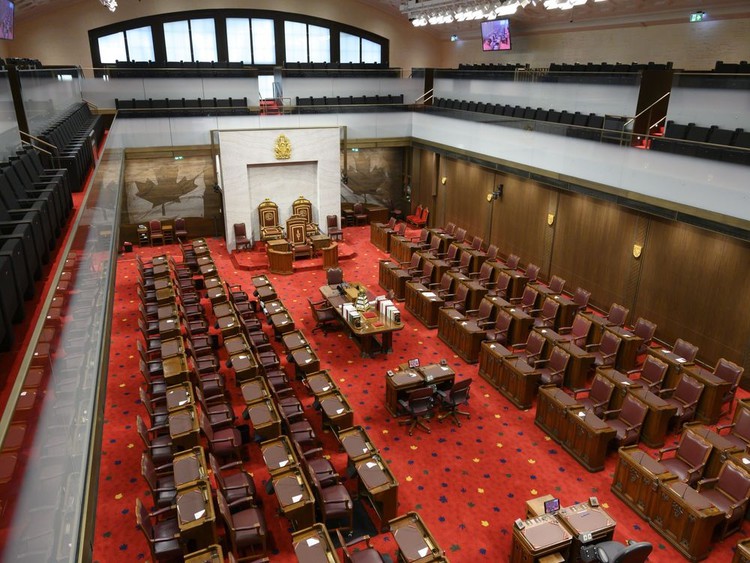
EDITORIAL: Trudeau's Internet censorship law still a big problem — Toronto Sun
The Trudeau Liberal government remains obsessed with bringing in regulations that are poised to regulate and, in turn, censor the Internet. It’s remarkable that after all of the backlash these plans have received from a whole host of voices — academics, major corporations, opposition parties...apple.news
It’s remarkable that after all of the backlash these plans have received from a whole host of voices — academics, major corporations, opposition parties, regular Canadians — the Liberals refuse to back down.
Write your senators about this issue & let them know your opinion on this matter.
EDITORIAL: Trudeau's Internet censorship law still a big problem — Toronto Sun
The Trudeau Liberal government remains obsessed with bringing in regulations that are poised to regulate and, in turn, censor the Internet. It’s remarkable that after all of the backlash these plans have received from a whole host of voices — academics, major corporations, opposition parties...apple.news
It’s remarkable that after all of the backlash these plans have received from a whole host of voices — academics, major corporations, opposition parties, regular Canadians — the Liberals refuse to back down.
Bill C-11 is the most well-known of a handful of measures the Liberals have devised that involve restrictions on our online activities. The most controversial part of this legislation are the aspects that will effectively give government bodies the ability to start regulating user-generated content — which basically means things like videos that people post to YouTube, TikTok and elsewhere.
This could be a slippery slope to the government censoring things they disapprove of. Likewise, they are seized with creating laws against “online harms,” which is shorthand for things people say on the Internet that aren’t illegal but offend people or hurt their feelings (or that they just strongly disagree with).
Bill C-11 is still winding its way through the legislative process. It is now going through committee hearings in the Senate.
Instead of aiming to create conditions for people to pursue their unique versions of the good life, there are growing attempts to mandate a shared objective. We’ve pivoted from enforcing minimum standards to attempting to regulate what one segment of society deems to be optimal standards for all.
This is playing out in real time in Canadian politics. Some of the issues that the Liberal government of Prime Minister Justin Trudeau are most seized with involve backing people into a corner in the name of some high-flung subjective goal that everyone must bow before.
The government’s approach to green and climate policies works this way. They say that catastrophe will unfold in the years ahead if we don’t live a certain way. “OK, thanks for the heads up,” you say, “I’ll review the situation and make my choices accordingly.” But that is not enough for them. They’re not satisfied with a sliding scale of compliance; instead they have to implement increasingly onerous regulations that leave you little say in the matter.
Then there’s the ongoing obsession with regulating the Internet. The Trudeau government is currently waging a multi-pronged effort to make Canadians’ online conduct conform to their worldview. In addition to the contentious Bill C-11 that will give government bodies a say over content like YouTube and TikTok videos, they want to create things like a “Digital Safety Commissioner” or revise the laws to protect us from vaguely defined “online harms.”

 apple.news
apple.news
Should you be rude and offensive to people online? Probably not. But that’s up to adults to work out for themselves. It’s not the domain of the nanny state.
Perhaps the worst recent example is the widespread vilification of that small percentage of people who chose, for whatever their reason, not to take COVID-19 vaccines. There really is nothing under the sun that sees absolutely everyone in agreement. So we shouldn’t have been surprised that around 10% of people didn’t care for the vaccine. If anything, the shocker was that the number went as high as it did. Yet we just couldn’t leave the unvaccinated alone.
What will it be next?
This is playing out in real time in Canadian politics. Some of the issues that the Liberal government of Prime Minister Justin Trudeau are most seized with involve backing people into a corner in the name of some high-flung subjective goal that everyone must bow before.
The government’s approach to green and climate policies works this way. They say that catastrophe will unfold in the years ahead if we don’t live a certain way. “OK, thanks for the heads up,” you say, “I’ll review the situation and make my choices accordingly.” But that is not enough for them. They’re not satisfied with a sliding scale of compliance; instead they have to implement increasingly onerous regulations that leave you little say in the matter.
Then there’s the ongoing obsession with regulating the Internet. The Trudeau government is currently waging a multi-pronged effort to make Canadians’ online conduct conform to their worldview. In addition to the contentious Bill C-11 that will give government bodies a say over content like YouTube and TikTok videos, they want to create things like a “Digital Safety Commissioner” or revise the laws to protect us from vaguely defined “online harms.”
FUREY: Freedom is a growing concern for Canadians — Toronto Sun
One of the best parts of my job as a columnist has always been the reader feedback and hearing from people of all walks of life from across the country and beyond. Sometimes they’re writing to agree, other times to disagree. Sometimes they’re sharing a news tip or an anecdote or just relaying...
Should you be rude and offensive to people online? Probably not. But that’s up to adults to work out for themselves. It’s not the domain of the nanny state.
Perhaps the worst recent example is the widespread vilification of that small percentage of people who chose, for whatever their reason, not to take COVID-19 vaccines. There really is nothing under the sun that sees absolutely everyone in agreement. So we shouldn’t have been surprised that around 10% of people didn’t care for the vaccine. If anything, the shocker was that the number went as high as it did. Yet we just couldn’t leave the unvaccinated alone.
What will it be next?
The Globe and Mail reported late on Tuesday night that Bittle – together with his colleague, Liberal MP Lisa Hepfner – had sent a letter to the Lobbying Commissioner to seek an investigation into the funding of Digital First Canada, a group representing digital first creators. The letter may have been shopped around to other MPs as Liberal MP Anthony Housefather has told the Globe he did not sign it.
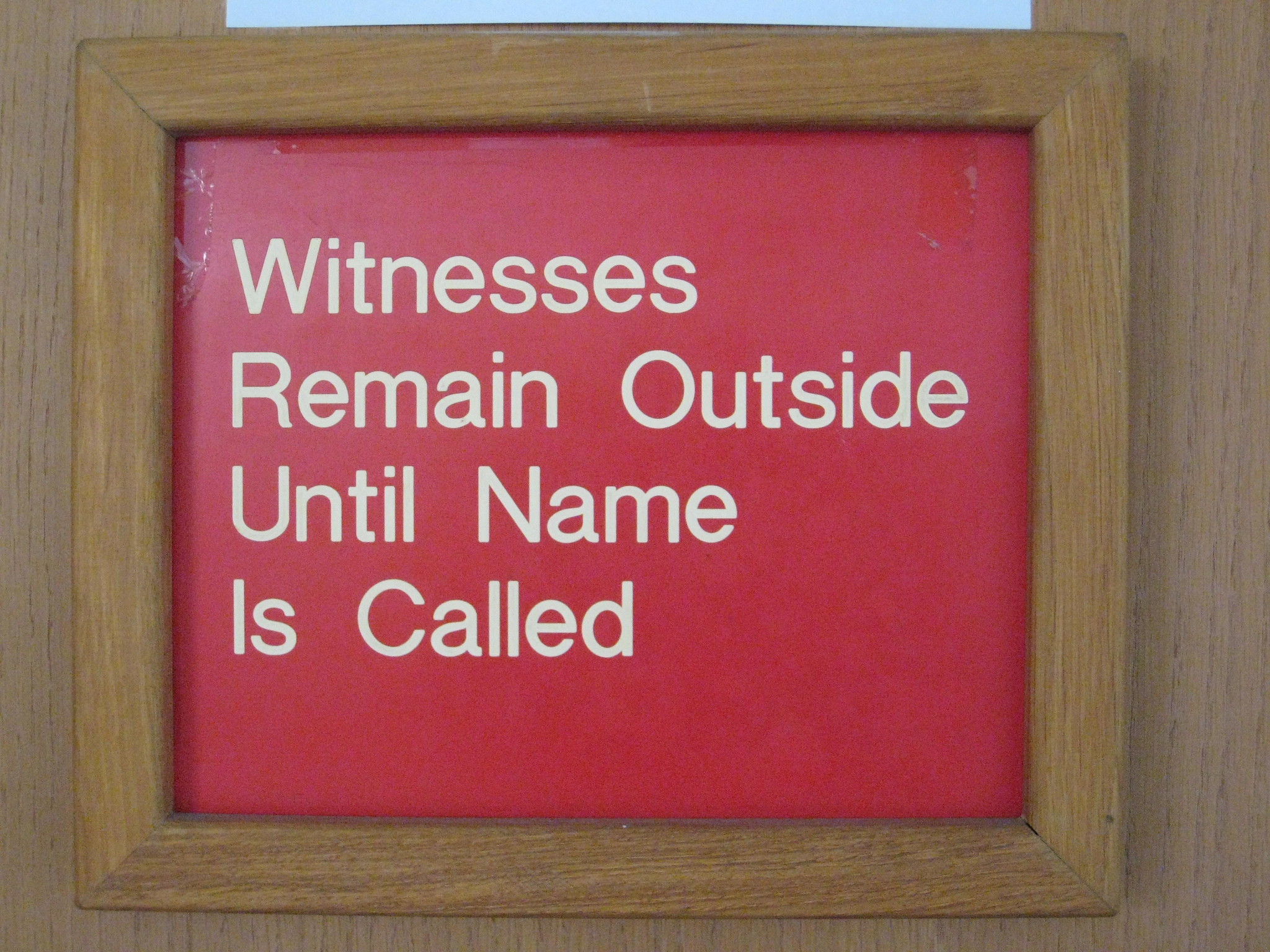
 www.michaelgeist.ca
The letter and leak smacked of witness intimidation and bullying with the government seeking to undermine critics of the legislation hours before a Senate appearance. Indeed, the entire tactic felt like the policy equivalent of a SLAPP suit, which are used to intimidate and silence critics through litigation. By the end of the day, the tactic had clearly backfired on Bittle and the government. Conservative MP John Nater fileda point of privilege in the House of Commons, arguing that Bittle had attempted to intimidate a Senate witness.
www.michaelgeist.ca
The letter and leak smacked of witness intimidation and bullying with the government seeking to undermine critics of the legislation hours before a Senate appearance. Indeed, the entire tactic felt like the policy equivalent of a SLAPP suit, which are used to intimidate and silence critics through litigation. By the end of the day, the tactic had clearly backfired on Bittle and the government. Conservative MP John Nater fileda point of privilege in the House of Commons, arguing that Bittle had attempted to intimidate a Senate witness.

 www.theglobeandmail.com
www.theglobeandmail.com

 macdonaldlaurier.ca
macdonaldlaurier.ca

Bill C-11 Goes Off The Rails Amid Charges of Witness Intimidation and Bullying by Government MPs - Michael Geist
The Senate Bill C-11 hearings have provided a model for the much-needed, engaged, non-partisan inquiry that was largely missing from the House committee’s theatrics in which the government cut off debate on over 150 amendments. But this week those hearings attracted attention for another reason...
 www.michaelgeist.ca
www.michaelgeist.ca
Critic of Bill C-11 should be investigated for failing to disclose funding from YouTube, says Liberal MP
The Heritage Minister’s Parliamentary secretary, Chris Bittle, alleges that Digital First’s executive director Scott Benzie failed to disclose that his group received funding from YouTube and TikTok

Bill C-11 critics are now Enemies of the People: Peter Menzies in the Line | Macdonald-Laurier Institute
Last week, shortly after midnight in Ottawa, the House of Commons Heritage Committee concluded its deliberations on the Online Streaming Act, which will grant a federal regulator authority over the global Internet.
Um do you know what's going on in Australia? It's even worse than we have it. They're under an autocratic PM.Time to move to Australia.. warmer, more Conservative and Canada is starting to suck ballocks.
To many Liberals
OTTAWA — Frances Haugen has a theory.
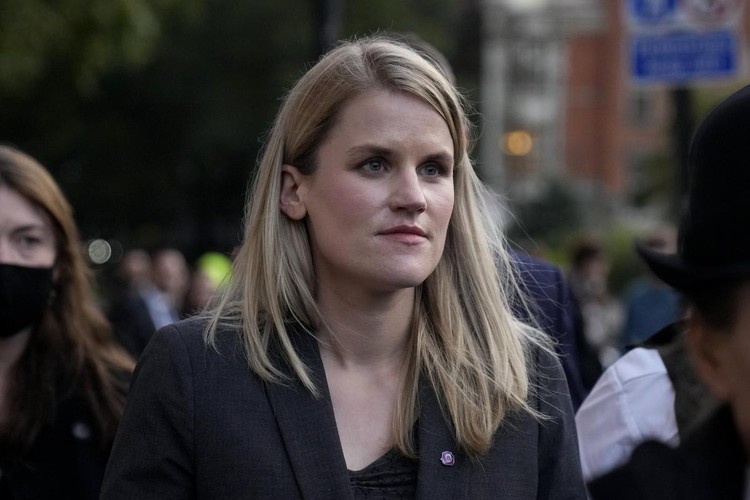
 apple.news
apple.news
It’s about what might have happened if Canada had an online safety law — a mechanism that would force social media companies to be more transparent about potentially harmful content on their platforms — before the so-called “Freedom Convoy” plunged the country’s capital into a history-making crisis.
“I guarantee you for the year before the trucker protests, you had people who were inflaming sentiments by the same kind of people who ended up participating in the protests,” the Facebook whistleblower told the Star.
Her trip comes at a time when Canada is preparing to introduce legislation to combat the rising tide of dangerous online content like hate speech and child sexual exploitation, and as lawmakers and experts are bracing for what is poised to be one of the country’s most charged debates on freedom of speech and censorship.
As for the anti-mandate protesters who gridlocked downtown Ottawa and brought major border crossings to a halt, Haugen said it was up to platforms like Facebook and Telegram — where thousands of convoy participants congregated to drum up support and hash out their plans — to keep tabs on the movement as it gained traction. (Oh…’cuz it’s 1984?)
“If Canada had that law, once Facebook saw the convoy protest doing (what happened in the U.S.) — using the same tools, radicalizing similar people and heading towards Ottawa — they would have had to show that they identified that risk, mitigated it, and shown us all the data about all the convoy protest communications,” said Owen, who was also a member of the federal government’s expert panel on online safety.
“All of that would have been made transparent. So I think it would have substantially changed that event happening, and if they didn’t do any of that, they’d be held liable.”
“There are countries that are looking at Canada,” Haugen said, adding that mid-sized countries, like Nordic nations and Brazil, are looking for partners to walk the road of online regulation.
Haugen said she has spoken about these ideas with the Canadian government, but wasn’t ready to disclose those discussions.
“I think there’s a really big opportunity for leadership, and Canada’s history of coalition building, I think, is a promising thing for the future.”

The chorus of Canadians from all walks of life calling on the Senate to kibosh the Trudeau government’s censorship bill is growing louder by the day. Last week, a letter from over 40,000 Canadian content creators urged senators to reject Bill C-11 in its current form, sounding the alarm on what they see as a very dangerous piece of legislation.
From day one, Heritage Minister Pablo Rodriguez, the government’s point person on C-11, has claimed his legislation is designed to support Canadian content creators, saying it “will help make sure that our cultural sector works for Canadians and supports the next generation of artists and creators.” He should have asked content-creators before making that claim!
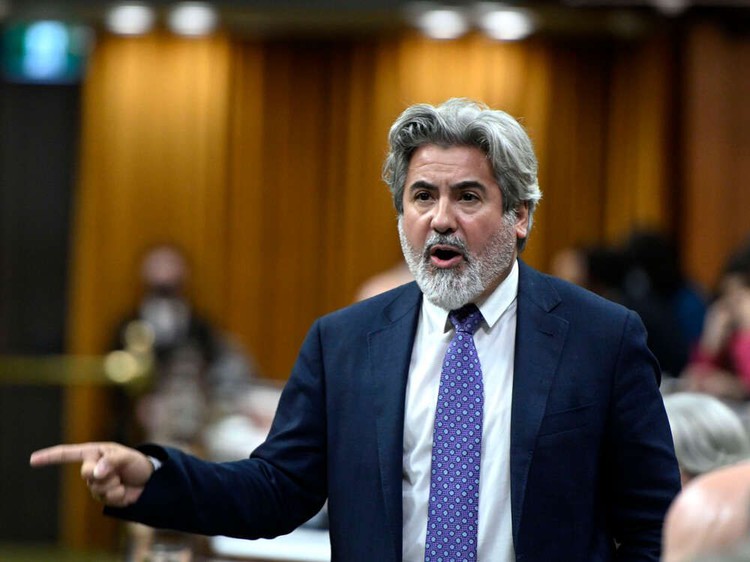
 apple.news
apple.news
In a letter sent to every member of the Senate, Digital First Canada, a group representing tens of thousands of small-scale Canadian content creators, warned that Bill C-11 could kill the careers of the very artists the Trudeau government claims it wants to help. “Right now, our livelihoods are at risk,” reads the letter. And it notes that the government rammed Bill C-11 through the House of Commons without any room for debate or amendments.
“Earlier this year, over 40,000 creators and users raised our voices in the House and through letters to defend our digital businesses against these changes. We were ignored.”
So much for having the backs of Canadian artists.
The original concerns about Bill C-11 also remain. If government bureaucrats get to choose what content to push on Canadians, there’s a very real risk the government will be tempted to use its filtering powers to silence its critics.
With Bill C-11 now in the Senate, members of Canada’s upper house have an opportunity to at least give the bill the scrutiny it ought to have had when it was before the House of Commons. So far senators on the transport and communications committee have heard from dozens of witnesses warning about the dangers of C-11. With widespread opposition to the bill coming from all corners of the country, the Senate should do more than simply amend the legislation. Senators should refuse to pass the bill altogether.
Given the scale of the opposition to C-11, the government may even be relieved to see it go.
Would the ‘Freedom Convoy’ have been different if Ottawa had an online harms law? A Facebook whistleblower says yes — Toronto Star
Facebook whistleblower Frances Haugen leaves after giving evidence to the joint committee for the Draft Online Safety Bill, as part of British government plans for social media regulation, at the Houses of Parliament, in London, Monday, Oct. 25, 2021.
It’s about what might have happened if Canada had an online safety law — a mechanism that would force social media companies to be more transparent about potentially harmful content on their platforms — before the so-called “Freedom Convoy” plunged the country’s capital into a history-making crisis.
“I guarantee you for the year before the trucker protests, you had people who were inflaming sentiments by the same kind of people who ended up participating in the protests,” the Facebook whistleblower told the Star.
Her trip comes at a time when Canada is preparing to introduce legislation to combat the rising tide of dangerous online content like hate speech and child sexual exploitation, and as lawmakers and experts are bracing for what is poised to be one of the country’s most charged debates on freedom of speech and censorship.
As for the anti-mandate protesters who gridlocked downtown Ottawa and brought major border crossings to a halt, Haugen said it was up to platforms like Facebook and Telegram — where thousands of convoy participants congregated to drum up support and hash out their plans — to keep tabs on the movement as it gained traction. (Oh…’cuz it’s 1984?)
“If Canada had that law, once Facebook saw the convoy protest doing (what happened in the U.S.) — using the same tools, radicalizing similar people and heading towards Ottawa — they would have had to show that they identified that risk, mitigated it, and shown us all the data about all the convoy protest communications,” said Owen, who was also a member of the federal government’s expert panel on online safety.
“All of that would have been made transparent. So I think it would have substantially changed that event happening, and if they didn’t do any of that, they’d be held liable.”
“There are countries that are looking at Canada,” Haugen said, adding that mid-sized countries, like Nordic nations and Brazil, are looking for partners to walk the road of online regulation.
Haugen said she has spoken about these ideas with the Canadian government, but wasn’t ready to disclose those discussions.
“I think there’s a really big opportunity for leadership, and Canada’s history of coalition building, I think, is a promising thing for the future.”

The chorus of Canadians from all walks of life calling on the Senate to kibosh the Trudeau government’s censorship bill is growing louder by the day. Last week, a letter from over 40,000 Canadian content creators urged senators to reject Bill C-11 in its current form, sounding the alarm on what they see as a very dangerous piece of legislation.
From day one, Heritage Minister Pablo Rodriguez, the government’s point person on C-11, has claimed his legislation is designed to support Canadian content creators, saying it “will help make sure that our cultural sector works for Canadians and supports the next generation of artists and creators.” He should have asked content-creators before making that claim!
Opinion: Senate should kill online censorship bill — Financial Post
Widespread opposition to the bill is coming from all corners of the country
In a letter sent to every member of the Senate, Digital First Canada, a group representing tens of thousands of small-scale Canadian content creators, warned that Bill C-11 could kill the careers of the very artists the Trudeau government claims it wants to help. “Right now, our livelihoods are at risk,” reads the letter. And it notes that the government rammed Bill C-11 through the House of Commons without any room for debate or amendments.
“Earlier this year, over 40,000 creators and users raised our voices in the House and through letters to defend our digital businesses against these changes. We were ignored.”
So much for having the backs of Canadian artists.
The original concerns about Bill C-11 also remain. If government bureaucrats get to choose what content to push on Canadians, there’s a very real risk the government will be tempted to use its filtering powers to silence its critics.
With Bill C-11 now in the Senate, members of Canada’s upper house have an opportunity to at least give the bill the scrutiny it ought to have had when it was before the House of Commons. So far senators on the transport and communications committee have heard from dozens of witnesses warning about the dangers of C-11. With widespread opposition to the bill coming from all corners of the country, the Senate should do more than simply amend the legislation. Senators should refuse to pass the bill altogether.
Given the scale of the opposition to C-11, the government may even be relieved to see it go.
It's hard to imagine how the Twaveling Twucktards could have been less harmful.
It's a fair point. When we look at virtually any other major protest such as the g-20 demonstrations etc, most were vastly more destructive and harder on property by an order of magnitude. This was actually about as peaceful as it gets. There's not much they could have done to be less destructive, and they stopped the honking when ordered by a judge.It's hard to imagine how the Twaveling Twucktards could have been less harmful.
Come on man it is a national emergency , making the Ottawa public service look so incompetent . They showed the whole country how to clean up the downtown . The public unions are aghast at how clean there city was . Don’t worry it is back to normal now .It's a fair point. When we look at virtually any other major protest such as the g-20 demonstrations etc, most were vastly more destructive and harder on property by an order of magnitude. This was actually about as peaceful as it gets. There's not much they could have done to be less destructive, and they stopped the honking when ordered by a judge.
And for free. ..... so they're anti-unionist job-killing hippie-dipps on top of being racist anti-gov't pro-covid american funded Russian inspired lunatics.Come on man it is a national emergency , making the Ottawa public service look so incompetent . They showed the whole country how to clean up the downtown . The public unions are aghast at how clean there city was . Don’t worry it is back to normal now .
If we're being honest - i don't know how the media missed that angle.
The chorus of Canadians from all walks of life calling on the Senate to kibosh the Trudeau government’s censorship bill is growing louder by the day.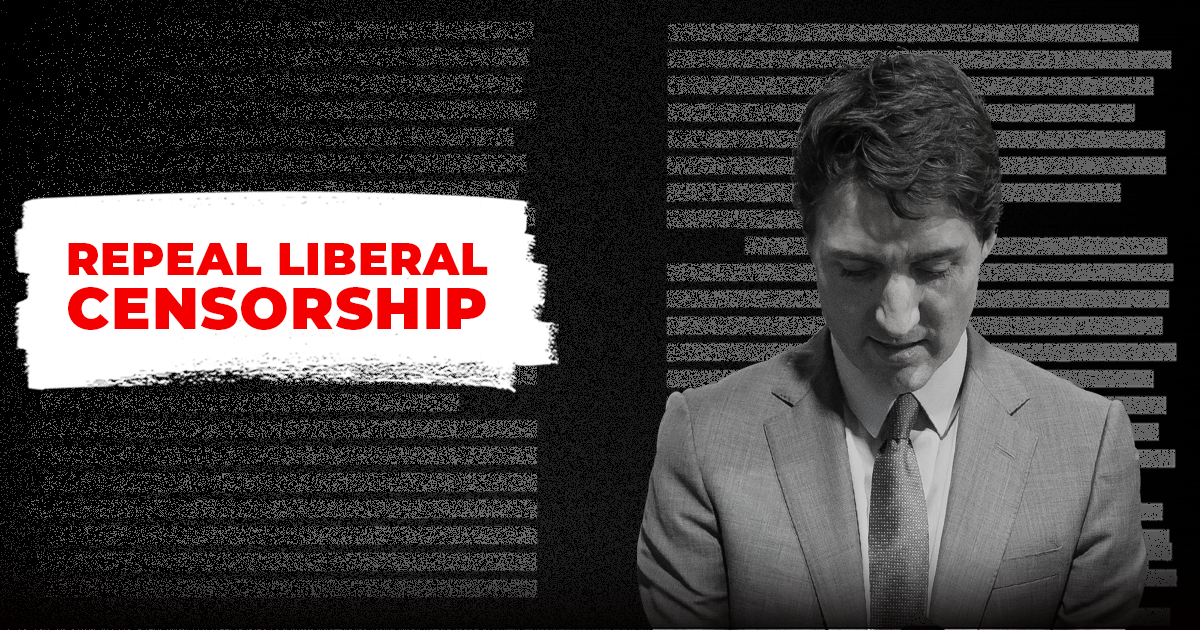
Repeal Liberal Censorship - Conservative Party of Canada
www.conservative.ca
Last week, a letter from over 40,000 Canadian content-creators urged senators to reject Bill C-11 in its current form, sounding the alarm on what they see as a very dangerous piece of legislation.
GOLDBERG: Opposition growing to Trudeau’s dangerous censorship bill — Toronto Sun
The chorus of Canadians from all walks of life calling on the Senate to kibosh the Trudeau government’s censorship bill is growing louder by the day. Last week, a letter from over 40,000 Canadian content-creators urged senators to reject Bill C-11 in its current form, sounding the alarm on what...
Initial concerns about Bill C-11 also remain. If government bureaucrats get to choose what content to push on Canadians, there’s a genuine risk the government will be tempted to use its filtering powers to silence its critics.
With Bill C-11 now in the Senate, members of Canada’s upper house have an opportunity to at least give the bill the scrutiny it ought to have had when it was before the House of Commons. And so far, senators on the transport and communications committee have heard from dozens of witnesses warning about the dangers of C-11. With widespread opposition to the bill coming from all corners of the country, the Senate should do more than simply amend the legislation. Senators should refuse to pass the bill altogether.
Given the scale of the opposition to C-11, the government may even be relieved to see it go.